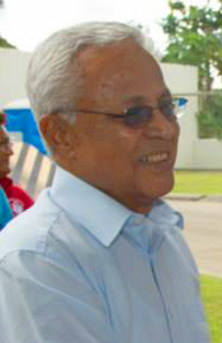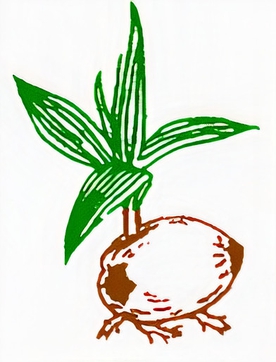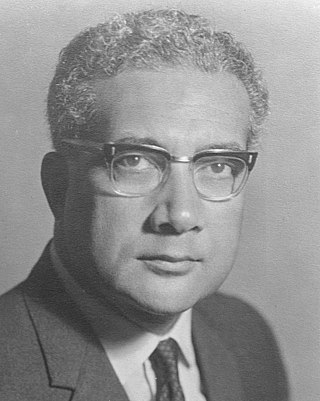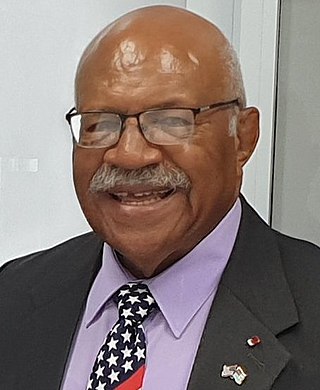
The politics of Fiji take place within the framework of a parliamentary representative democratic republic. Fiji has a multiparty system with the Prime Minister of Fiji as head of government. The executive power is exercised by the government. Legislative power is vested in both the government and the Parliament of Fiji. The judiciary is mostly independent of the executive and the legislature.

Mahendra Pal Chaudhry is a Fijian politician and the leader of the Fiji Labour Party. Following a historic election in which he defeated the long-time former leader, Sitiveni Rabuka, the former trade union leader became Fiji's first Indo-Fijian Prime Minister on 19 May 1999, but exactly one year later, on 19 May 2000 he and most of his Cabinet were taken hostage by coup leader George Speight, in the Fiji coup of 2000. Unable to exercise his duties, he and his ministers were sacked by President Ratu Sir Kamisese Mara on 27 May; Mara intended to assume emergency powers himself but was himself deposed by the military leader, Commodore Frank Bainimarama.

The Fiji Labour Party, also known as Fiji Labour, is a political party in Fiji. Most of its support is from the Indo-Fijian community, although it is officially multiracial and its first leader was an indigenous Fijian, Dr. Timoci Bavadra. The party has been elected to power twice, with Timoci Bavadra and Mahendra Chaudhry becoming prime minister in 1987 and 1999 respectively. On both occasions, the resulting government was rapidly overthrown by a coup.

Ratu Sir Kamisese Mara, was a Fijian politician, who served as Chief Minister from 1967 to 1970, when Fiji gained its independence from the United Kingdom, and, apart from one brief interruption in 1987, the first Prime Minister from 1970 to 1992. He subsequently served as President from 1993 to 2000.

The president of Fiji is the head of state of the Republic of Fiji. The president is appointed by the Parliament for a three-year term under the terms of the 2013 Constitution. Although not entirely a figurehead, the role of president in the government is largely ceremonial, but there are important reserve powers that may be exercised in the event of a crisis. In addition, the president is the commander-in-chief of the Republic of Fiji Military Forces.

The Great Council of Chiefs(Bose Levu Vakaturaga in Fijian) was a constitutional body in Fiji from 1876 to March 2012. In April 2007, the council was suspended, due to an unworkable relationship with Frank Bainimarama, leader of an "interim government" that came to power through military coup in December 2006. It was formally disestablished by decree in March 2012.
Brigadier-General Ratu Epeli Ganilau, MC, MSD, is a Fijian former military officer and politician. His career previously encompassed such roles as Commander of the Fiji Military Forces and Chairman of the Bose Levu Vakaturaga. On 15 January 2007 he was sworn in as Minister for Fijian Affairs in the interim Cabinet formed in the wake of the military coup which deposed the Qarase government on 5 December 2006.

Sitiveni Ligamamada Rabuka is a Fijian politician who has served as Prime Minister of Fiji since 24 December 2022. He was the instigator of two military coups in 1987. He was democratically elected as Prime Minister of Fiji, serving from 1992 to 1999, and again in 2022, leading a three-party coalition. He also served as Chairman of the Great Council of Chiefs from 1999 to 2001, and later as Chairman of the Cakaudrove Provincial Council from 2001 to 2008.

Tupeni Lebaivalu Baba is a Fijian academic and politician, who founded the now-defunct New Labour Unity Party. Most members of this party later merged with several other centrist parties to form the Fiji Democratic Party. A former Professor of Education at the University of the South Pacific (USP), he later served as a senior research fellow at the Centre for Pacific Studies at the University of Auckland in New Zealand, from 2001 to the end of 2005. In the general election scheduled for 6–13 May 2006, Baba attempted a political comeback, this time on the ticket of the ruling Soqosoqo Duavata ni Lewenivanua (SDL), a political switch that generated a considerable degree of public discussion. Although his bid was unsuccessful, he was subsequently appointed to the Senate as one of nine nominees of the Fijian government.

The Fijian coups d'état of 1987 resulted in the overthrow of the elected government of Fijian Prime Minister Timoci Bavadra, the deposition of Elizabeth II as Queen of Fiji, and in the declaration of a republic. The first coup d'état, in which Bavadra was deposed, took place on 14 May 1987; a second coup d'état on 25 September ended the monarchy, and was shortly followed by the proclamation of a republic on 10 October. Both military actions were led by Lieutenant Colonel Sitiveni Rabuka, then third in command of the Royal Fiji Military Forces.

Josaia Voreqe "Frank" Bainimarama is a Fijian politician and former naval officer who served as the prime minister of Fiji from 2007 until 2022. A member of the FijiFirst party, which he founded in 2014, he began his career as an officer in the Fijian navy and commander of the Fijian military. He has been serving as the opposition leader since 24 December 2022.

General elections were held in Fiji between 8 and 15 May 1999. They were the first election held under the revised Constitution of 1997, which instituted a new electoral system and resulted in Mahendra Chaudhry taking office as Fiji's first Indo-Fijian Prime Minister.

The Fijian Association Party (FAP) is a former political party in Fiji. It played a significant role in Fijian politics throughout the 1990s, but lost all of its seats in the House of Representatives in the parliamentary election of 2001.

The Fiji coup d'état of 2000 was a civilian coup d'état by hardline i-Taukei nationalists against the elected government of an Indo-Fijian Prime Minister, Mahendra Chaudhry on 19 May 2000. This was followed by an attempt on 27 May by President Ratu Sir Kamisese Mara to assert executive authority, and then by a military coup on 29 May by Republic of Fiji Military Forces Commander Commodore Frank Bainimarama. The coups resulted in the removal of the elected government and its replacement by an interim regime headed by Josefa Iloilo. In March 2001 the Court of Appeal of Fiji ruled that the coups and interim regime were illegal. An elected government was finally restored by the 2001 Fijian general election.
Mohammad Apisai Vuniyayawa Tora was a Fijian politician, soldier, and trade unionist. As a labour leader, he was a fighter for dock workers. As a soldier, he served in Malaya and later served as President of the Ex-Servicemen's League.

General elections were held in Fiji between 6 and 13 May 2006.

The Reconciliation and Unity Commission was a proposed government body to be set up if the Reconciliation, Tolerance, and Unity Bill, which was introduced into the Fijian Parliament on 4 May 2005 was passed. The legislation proposed to empower the Commission to grant amnesty to perpetrators of the Fiji coup of 2000, and compensation to victims of it from 19 May 2000 through 15 March 2001. The Fijian President would retain a veto over the granting of amnesty.

The Fijian coup d'état of December 2006 was a coup d'état in Fiji carried out by Commodore Frank Bainimarama, Commander of the Republic of Fiji Military Forces (RFMP), against Prime Minister Laisenia Qarase and President Josefa Iloilo. It was the culmination of a political crisis that started the previous year, when the Qarase government introduced three bills to the Fijian Parliament. The Qoliqoli, Land Tribunal, and Reconciliation, Tolerance, and Unity Bills dealt with the ongoing ethnic conflicts in Fiji and the aftermath of the 2000 coup, and were considered to be pro-ethnic Fijian. Bainimarama presented the government with a list of demands on October 16 that included withdrawing the bills. Attempts at negotiation failed and the military launched the coup on 4 December. Parliament was dissolved, Qarase and his cabinet were dismissed, and some civilian officials were placed under house arrest. After the Great Council of Chiefs refused to appoint a cabinet friendly to the military, Bainimarama reached an understanding with Iloilo and reinstated him as President on 4 January 2007. Iloilo then appointed Bainimarama acting Prime Minister in charge of the Interim Cabinet.

Ratu Josefa Iloilovatu Uluivuda, was a Fijian politician who served as the 3rd President of Fiji from 2000 until 2009, excluding a brief period from 5 December 2006 to 4 January 2007. He held the traditional title of Tui Vuda, the paramount chief of the Vuda district in Ba Province on Fiji's northwest coast. Like many Fijian people, he rarely used his surname and was known simply as Josefa Iloilo. He announced on 28 July 2009 that he would be leaving office on 30 July. At the age of 88, he was the world's oldest head of state.











